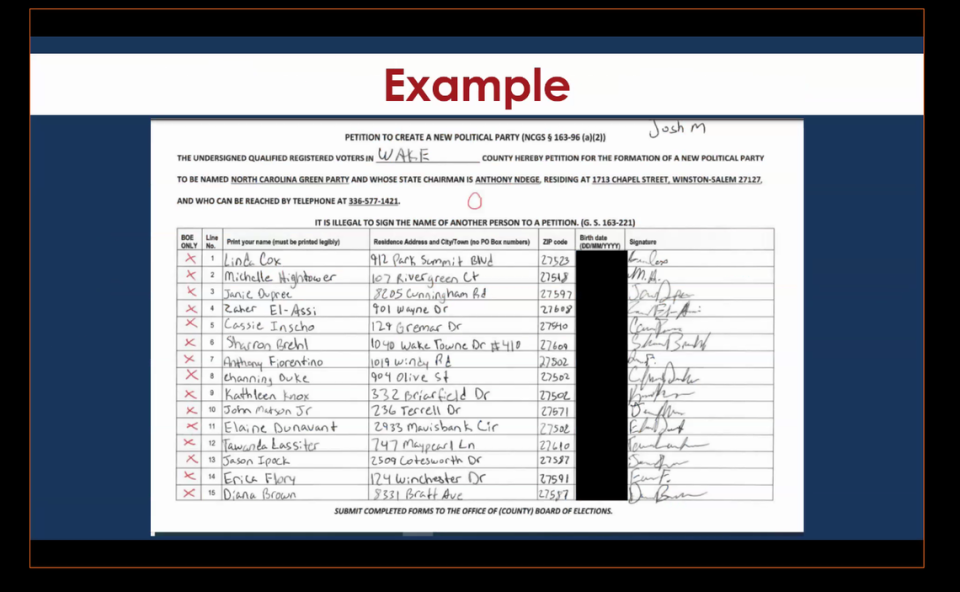NC elections board votes against certifying Green Party. Here’s what that means.
Citing concerns of possible fraud, the North Carolina State Board of Elections voted 3-2 against certifying the Green Party as an official party until further investigation can be completed.
The board has almost certainly prevented the party from running in this fall’s midterm elections since the deadline for filing and nominating candidates is July 1.
The NCSBE’s vote fell along party lines, with the board’s three Democrats voting against certification and the two Republicans voting in favor.
The N.C. Green Party is a leftist, anti-capitalist party that advocates for free health care, housing as a human right and a host of other progressive changes, according to the organization’s website.
Board of Elections staff gave a presentation in which they argued the petition sheets submitted by the Green Party showed several “obvious signs of fraud.” Among these, the staff said they had witnessed similar signatures, partial dates of birth and deceased voters being included in petition sheets.
“When you look at these cumulatively, we feel like there is a cloud over how many signatures are valid,” Karen Brinson Bell, a state board staff member, said during the presentation.

Katelyn Love, the board’s legal counsel, said there could be criminal consequences for any potential fraud found, noting that it was a misdemeanor to sign the name of another person on a petition and a felony to knowingly swear falsely about an election.
Later in the meeting, the board’s chair, Damon Circosta, referred to the case as a “criminal investigation.”
A spokesperson for the State Board of Elections later clarified that the investigation was currently internal, and any criminal findings would be referred to law enforcement following the board’s review.
Matthew Hoh, the North Carolina Green Party’s presumptive nominee for U.S. Senate, decried the board’s decision.
“It certainly was a very partisan affair,” he said. “And this helps prove the point that we’re trying to make that the two party system is exclusionary, it’s not democratic and it’s harmful.”
The Democratic Senatorial Campaign Committee previously began contacting people who signed the Green Party’s petition, asking them to retract their signatures, The News & Observer reported.
“If the Green Party is on the ballot it will give Republicans a huge advantage that will help them win in North Carolina in 2022 and 2024,” texts from the DSCC to signatories said.
During Thursday’s meeting, Republican board member Tommy Tucker mentioned that the board had received emails from the Elias Law Group, a powerful Democrat-affiliated firm that serves as the DSCC’s general counsel. The Elias Group contacted the board, according to Tucker, to allege several potential cases of fraud in the Green Party’s petition campaign.
“There must be something advantageous for the Democrat party, not having the Green Party on the ballot,” Tucker said.
Hoh acknowledged that some contracted petition gatherers for the party had made mistakes while gathering signatures, but contended that those erroneous ballots had never been included in the signature count verified by county boards.
The Green Party had submitted over 22,000 signatures to the NCSBE — seeming to surpass the 13,865 signature requirement. Of these, county boards validated nearly 16,000 signatures, giving the party a 2,000-signature lead.
However, staff for the state board said the number of questionable signatures exceeded the party’s lead. They recommended members table the vote until an investigation could be completed.
The board’s two Republican members, Tucker and Stacy Eggers, said tabling the vote would have practically the same effect as denying certification. The party would still miss the July 1 deadline to nominate.
“I know there’s more investigation to be done,” Eggers said, “but I’m mindful of the potential for harm.”
Circosta said that while he supports the right of third parties to run, there were far too many questions to be able to certify the Green Party on Thursday.
“I’ve been a long, firm believer that parties beyond the Democratic and Republican Party should have access to the ballot,” he said. “And it is my hope that the Green Party, if it can meet all of its statutorily required requirements, would be on the ballot as well. But our job here at the state board is to get it right — not necessarily fast.”
Tucker moved to vote on certification, rather than table the issue, resulting in the board rejecting the Green Party’s certification.
The state board’s investigation into potential fraud will continue. It’s unclear what avenues the Green Party may now have to appear on the ballot. Love said the board does not have the statutory authority to extend the July 1 deadline, but a court possibly could.
Love said the Green Party’s case had led staff to consider making recommendations for legislative changes to the General Assembly. Among these were the suggestion that it be illegal to pay petition gatherers by signature and requiring petition pages to identify the person gathering the signatures.

 Yahoo Movies
Yahoo Movies 
